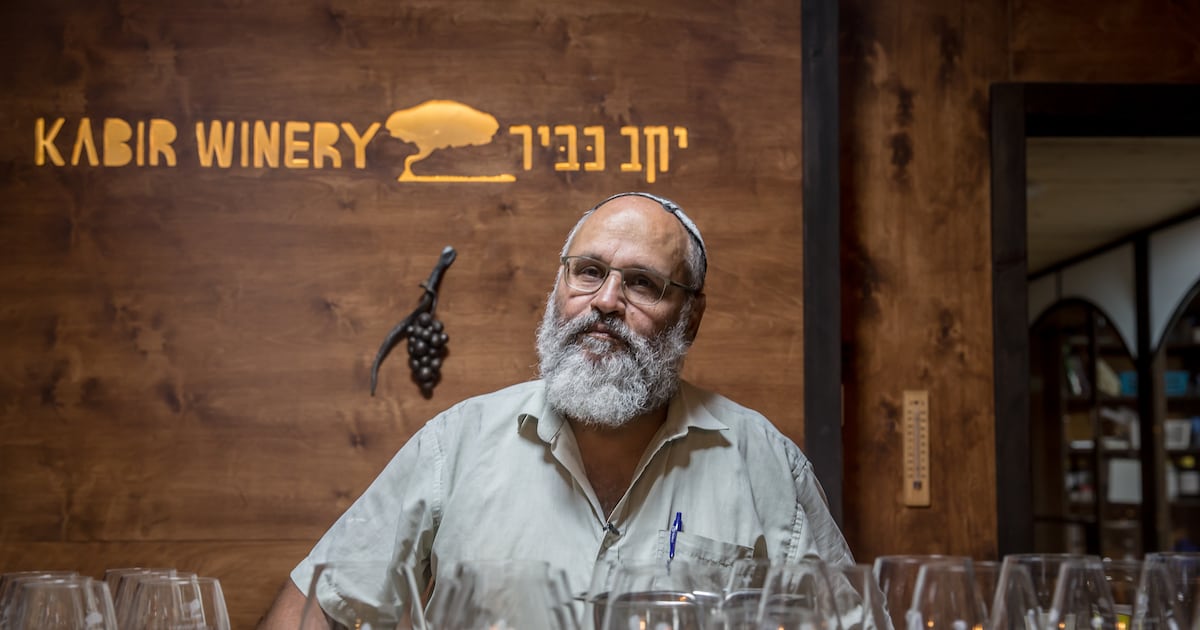In the distance, the Palestinian city of Nablus spreads out between the mountains; the Israeli military checkpoints surrounding it are not noticeable from here. The urban grey contrasts with the deep green of the settlement vineyard in the foreground, where a Thai worker labours beside an Israeli flag. No Palestinians are employed here.
Neither are Palestinians present in the Kabir Winery restaurant, where visitors can admire the view over salads and coffees. This is the settlement of Elon Moreh, which a UN report says is set on land confiscated from three nearby Palestinian villages. The blooming flowers around the settlement, and contrast in vineyard green versus distant grey, is a reminder of how much better water access is in Israeli-controlled areas.
“This land is wonderful for wine, one of the best in Israel,” says wine maker Eliav Hillel (67), who boasts growing more than 21 varieties of grape, including some “very rare” ones.
He calls this “Israel”, despite it being internationally recognised as Palestinian territory, inside a settlement deemed illegal under international law.
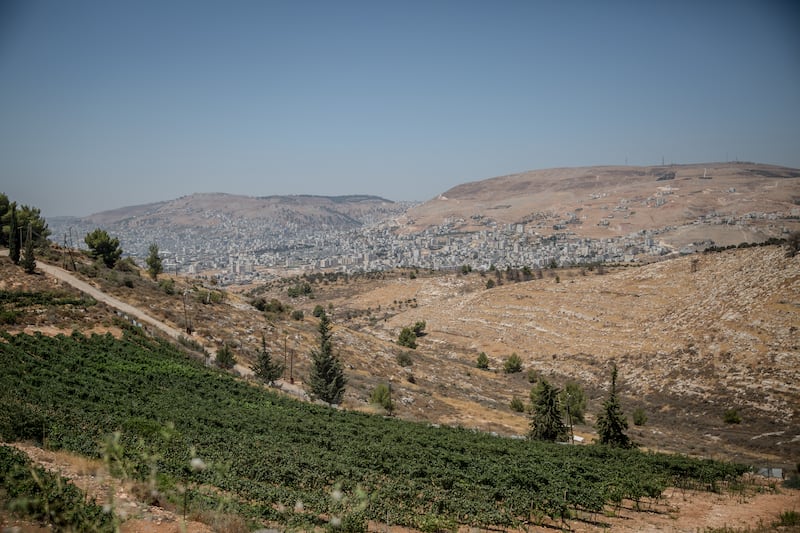 A view of the Palestinian city of Nablus from the settlement of Elon Moreh. Photograph: Sally Hayden
A view of the Palestinian city of Nablus from the settlement of Elon Moreh. Photograph: Sally Hayden
Here, he has discovered “paradise”, Mr Hillel says: “Good people, good life, good views.”
His positivity persists despite warplanes audibly flying overhead, maybe towards Gaza, where Israel is accused of carrying out a genocide, or Syria, where Israeli forces have carried out hundreds of airstrikes since the fall of Bashar al-Assad’s regime late last year.
In 2007, Mr Hillel – a former computer programmer – and a business partner started Kabir Winery on two acres of land; now they have 50 or more, Mr Hillel says.
They also have a visitors’ centre, with Americans, in particular, supporting by “visiting, buying wine, eating at the restaurant”. Mr Hillel says they produce 15,000 bottles of wine a year, all sold to visitors or the Israeli market. A gun hangs from a holster on his belt, which he says he carries for “self-defence”.
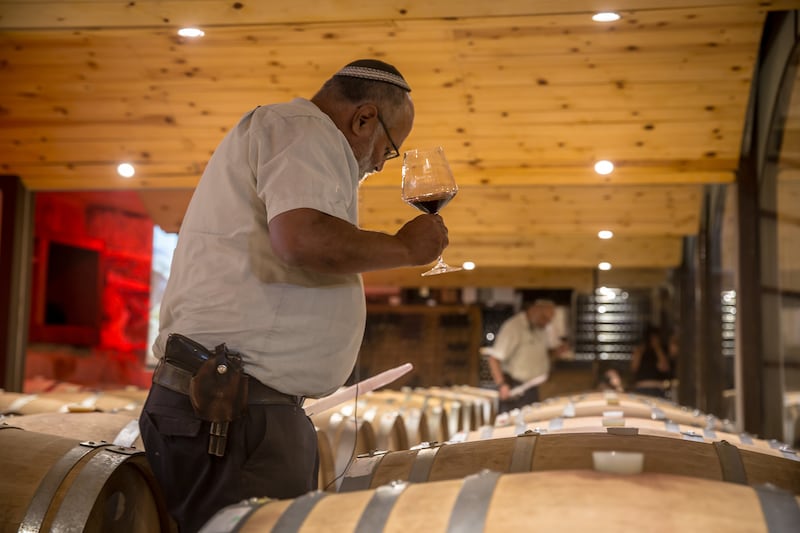 Wine maker and settler Eliav Hillel (67) always carries a gun in a holster for ‘self-defence’. Photograph: Sally Hayden
Wine maker and settler Eliav Hillel (67) always carries a gun in a holster for ‘self-defence’. Photograph: Sally Hayden 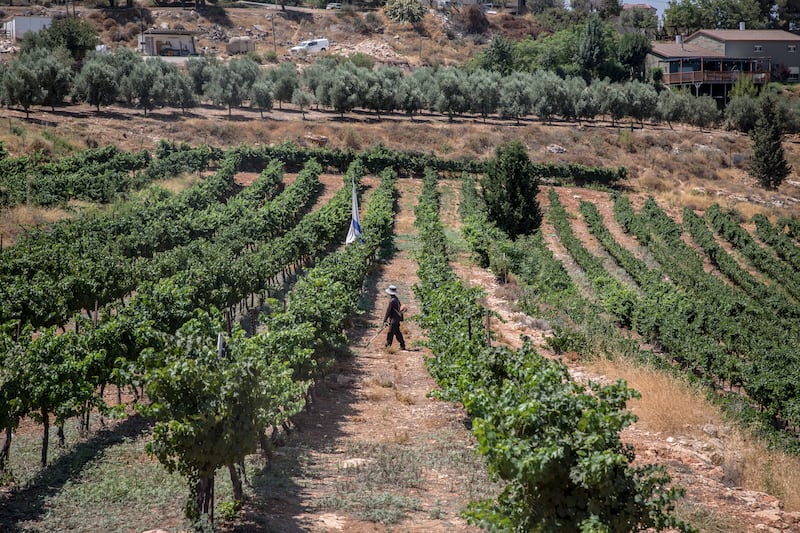 A Thai worker in a vineyard in the settlement of Elon Moreh. Photograph: Sally Hayden
A Thai worker in a vineyard in the settlement of Elon Moreh. Photograph: Sally Hayden
Settlements
The Irish Times travelled around Israeli settlements in the occupied West Bank as part of a media tour organised by MediaCentral, a Jerusalem-based organisation, which describes itself as a non-profit liaison service for journalists. It is linked with pro-Israeli media advocacy group HonestReporting, which chose interviewees and arranged most of the interviews in advance.
Separately, The Irish Times also visited surrounding Palestinian towns and cities, meeting many Palestinians who said that Israel’s military occupation of the West Bank affects every aspect of their existence. Their communities are divided, their territory fragmented and journeys between each area uncertain because of Israeli checkpoints. They believe their lives are deliberately being made unbearable, with the goal of forcing them to leave.
Some said this tactic was working, with increasing numbers of Palestinians pushed abroad or into crowded urban areas. Yet the majority have nowhere else to go, or say they are determined to stay on land their families have lived on for generations.
The Israeli settlements are deemed illegal under international law, with an advisory opinion from the International Court of Justice last year ordering them to be evacuated and saying reparations should be paid to Palestinians. Human rights organisations and experts have repeatedly denounced what they perceive as ethnic cleansing.
Along with Gaza and East Jerusalem, the occupied West Bank – which has a landmass roughly the same size as Co Mayo – is the area which many Palestinians hoped would make up a future Palestinian state. But Israeli settlers – who refer to the West Bank as “Judea and Samaria” – want to make that impossible.
They are backed by Israel’s government, with Israeli media reporting that far-right Israeli finance minister Bezalel Smotrich has allocated $73 million (€63 million) to settlement projects this year alone.
In July, Israel’s Knesset took a symbolic vote to completely annex the West Bank. That same month, hundreds of Israelis – including Israeli communications minister Shlomo Karhi – marched towards Gaza, calling for settlements to be re-established there too.
Israel has also given formal approval to a new settlement project known as E1, which critics say is aimed at splitting the West Bank in two and isolating it from East Jerusalem; it is also considered occupied Palestinian land under international law.
Many wonder where this will end. Israeli prime minister Binyamin Netanyahu recently said he is attached to a vision of “greater Israel”, which some analysts say may involve permanently occupying land in Syria and Lebanon, as well as parts of Egypt and Jordan.
Citizenship
In Itamar, a short drive from Elon Moreh, Moshe Goldsmith (61) explains that he was born in Brooklyn, in the US, to Zionist parents who “taught us to love Israel”. Jewish people around the world are called on to “make aliyah”, and move to Israel or the Palestinian land it occupies, where they can quickly receive Israeli citizenship and government support.
The world is against us unfortunately. When does the world like Israel? When we’re in Auschwitz. That’s when they like us. They can make plaques about us, museums about us … But when Israel lifts its head up and fights back for its very existence, that’s when the world hates us, and that’s the way it’s been
— Moshe Goldsmith
Mr Goldsmith says he moved here in the 1980s, six weeks after marrying his wife, another American. “A Jewish person cannot really be complete unless he’s living in the land of Israel,” says Mr Goldsmith, who believes they are “fulfilling the words of the prophets”.
“We didn’t feel comfortable just living in a city … We were looking to do something in the pioneer realm,” he says.
 Brooklyn-born Moshe Goldsmith (61) believes he is ‘fulfilling the words of the prophets’. Photograph: Sally Hayden
Brooklyn-born Moshe Goldsmith (61) believes he is ‘fulfilling the words of the prophets’. Photograph: Sally Hayden
He and his wife wanted to “connect to our biblical heroes, King David, Abraham, Isaac and Jacob … We had tremendous motivation as people that felt a calling to come back home, and that’s what brought us here”.
The couple were among Itamar’s founders; there are now around 2,000 residents from 30 families. Mr Goldsmith calls it “the Bible belt”.
“I don’t know why people in the world can’t understand that we deserve to live a life in the land that God gave to Israel,” Mr Goldsmith says.
He says they could “easily” have built Israel “in Uganda” instead, but had to take this land because it was given to them by God.
He says the world’s media is being “fed by lies” about the existence of settler violence, treating Israel as “always the guilty one”. While there may have been “sporadic incidents” of settler violence, it is mostly “fake news”, he says.
Why is Ireland so anti-Semitic? It’s just pure anti-Semitism and it’s not going to affect us. It’s unbelievable
— Moshe Goldsmith
He says he had not heard about a recent killing of two young Palestinian men by settlers, which happened around 16 kilometres away, in the Palestinian town of Sinjil.
“The world is against us unfortunately. When does the world like Israel? When we’re in Auschwitz. That’s when they like us. They can make plaques about us, museums about us … But when Israel lifts its head up and fights back for its very existence, that’s when the world hates us, and that’s the way it’s been.”
While the Palestinian Authority and Israel – not Hamas – share control of the West Bank, Mr Goldsmith also refers to the Hamas-led attacks of October 7th, 2023, as a justification. “What would you do? What would your country do if they had a similar attack?”
He says there is international outcry “when Israel fights back and defends itself” because “this inner hatred for the people of Israel is so ingrained in the world”.
The West Bank “is part of our country … Right now we’re living from the river to the sea, we have an Israeli country here … We are very happy with our borders that we have today. We would like to maintain them”.
He calls Israel the “only democracy” in the region, saying they have a military and a police force to deal with “crime”, despite the fact that theirs has been called an apartheid system by many human rights organisations, including Israeli ones.
Mr Goldsmith says the settler population is “growing immensely”, with around a 15 per cent increase each year. “There’s no reversing it any more.” He says they expect to reach one million settlers in the West Bank by 2030.
“Why is Ireland so anti-Semitic?” he responds, when asked for his view on Ireland’s proposed Occupied Territories Bill, which may see trade with Israeli settlements banned. “It’s just pure anti-Semitism and it’s not going to affect us. It’s unbelievable.”
He says some settlers export, but he expects the legislation would have “a reverse affect” on their businesses “because those who love Israel, support Israel, are going to strengthen and want to buy precisely products that are made here”.
Occupied land
“They need to understand that we’re going to be here and we’re not going to a different place,” says Davidi Ben Zion, the deputy governor of Shomron Regional Council, during an interview in the Barkan Industrial Park, also on occupied land. “No one can destroy more than 150 settlements.”
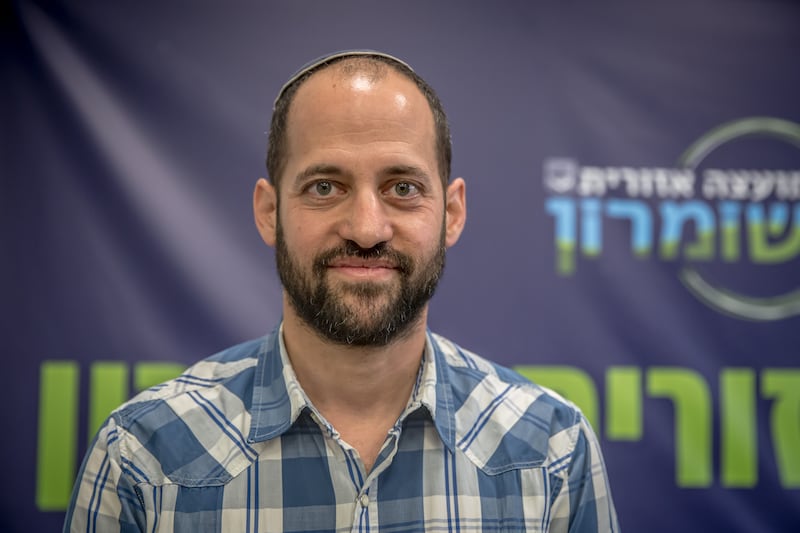 Davidi Ben Zion, the deputy governor of Shomron Regional Council in the occupied West Bank. Photograph: Sally Hayden
Davidi Ben Zion, the deputy governor of Shomron Regional Council in the occupied West Bank. Photograph: Sally Hayden
His council has an annual budget of roughly 400 million shekels (€104 million), he says, overseeing roughly 55,000 people across around 35 settlements, which he says makes it responsible for “12 per cent of [what he calls] the state of Israel”.
Mr Zion says Israeli settlements in the Palestinian territories are believed to provide an economic benefit of “tens of billions of shekels annually, with major sectors including high-tech, industry, agriculture, tourism, and services”.
He says the industrial zones and businesses overseen by the Shomron regional council “are a significant growth engine for the region and for Israel as a whole”.
While the majority of entrepreneurs and companies are Israeli, he says there are international investors too who “recognise the growth potential of the Shomron economy and want to take part in it”.
Everyone knows that Netanyahu and Trump support the settlement movement
— Davidi Ben Zion
The Palestinian-led Boycott, Divestment, and Sanctions (BDS) movement has had no impact on industrial work in the settlements, he says. “We have a waiting list of businessmen who want land for factories.”
Likewise, he says the Occupied Territories Bill would be a mistake, harming “both Israelis and Palestinians who work together daily in our businesses and factories”.
Last year, Yair Chetboun, the mayor of Ariel – a settlement city of more than 20,000 people nearby, which Palestinians were barred from entering – told The Irish Times that the impact of BDS had been “hard” but the availability of Palestinian labour for designated industrial areas was drawing investors back. “We have a lot of workers here … everyone wants that,” he said. “In the end, everyone wants to work with industry that gives … money.”
A Palestinian living in Nablus compared this system to factories in “bantustans” during apartheid South Africa, where black people were segregated but exploited for cheap labour.
Mr Zion says Palestinian workers employed in settlements are treated equally, though, in separate interviews, Palestinians who have worked in settlements say they face exploitation, harassment, can be fired for complaining about conditions, and are often encouraged to work illegally. They described travelling long hours every day because of lengthy waits at Israeli checkpoints, sometimes leaving home at 1am or 2am and returning home late at night.
They say they are forced to take the work because Israel has a stranglehold on their economy. Most also say they support a boycott on the settlements and are desperate for other options. Last March, Oxfam said around 29,000 Palestinians work in Israeli settlements – a small percentage of the roughly 3 million Palestinians believed to live in the West Bank.
Meanwhile, settlers are turning control of land and resources into income, which some use to gain more land.
Mr Zion is a member of the board of Keren Kayemet LeYisrael, a Zionist organisation which Human Rights Watch describes as having an “explicit mandate … to develop and lease land for Jews and not any other segment of the population”.
Founded more than a century ago, its annual budget of around 2 billion shekels (€517 million) supports projects including “forestry, environmental development, water reservoirs, land reclamation, education and Zionist heritage”, Mr Zion says. This money comes from both Jewish supporters around the world and income from the land the organisation owns or controls.
Mr Zion, a father of seven, says he is a major and paratrooper in the IDF and has fought “more than 300 days” in Gaza and Lebanon over the past two years. He compares Hamas leaders to “Nazis” and says he believes US president Donald Trump deserves the Nobel Peace Prize. “Everyone knows that [Israeli prime minister Binyamin ] Netanyahu and Trump support the settlement movement,” he says.
He calls US ambassador to Israel Mike Huckabee a “brave partner of Judea and Samaria” and says Europeans bear responsibility for selling a false reality of a two-state solution.
Mr Zion also dismisses reports of settler violence, saying that in the West Bank “maybe 40 or 50 teenagers … unfortunately, make these violent activities”.
Yet Mr Zion himself has been accused of inciting violence against Palestinians. In 2023, Dawn, the non-profit founded by slain Saudi journalist Jamal Khashoggi, called for the US government to arrest Mr Zion, “in relation to an act of incitement to genocide”, while he was on a visit to the US where it believed he was fundraising. This came after Mr Zion tweeted that the Palestinian town of Huwara should be “erased”.
Afterwards, hundreds of armed Israeli settlers stormed Huwara and surrounding villages, burning or vandalising at least 200 buildings and killing one Palestinian, in an assault described as the worst settler attack in decades.
Mr Zion says he had expressed himself in a “way that was inappropriate” and now regrets, while reacting to the killing of two Israelis by a Palestinian gunman. “I clarified very shortly afterwards that my intention was not directed at harming civilians, but rather at calling for a strong response by the government against terrorism and its infrastructure.”
Enemies
Back in the settlement of Elon Moreh, two women are eating pecan pie. Both their husbands are soldiers – fighting in Gaza, Syria and Lebanon, they say.
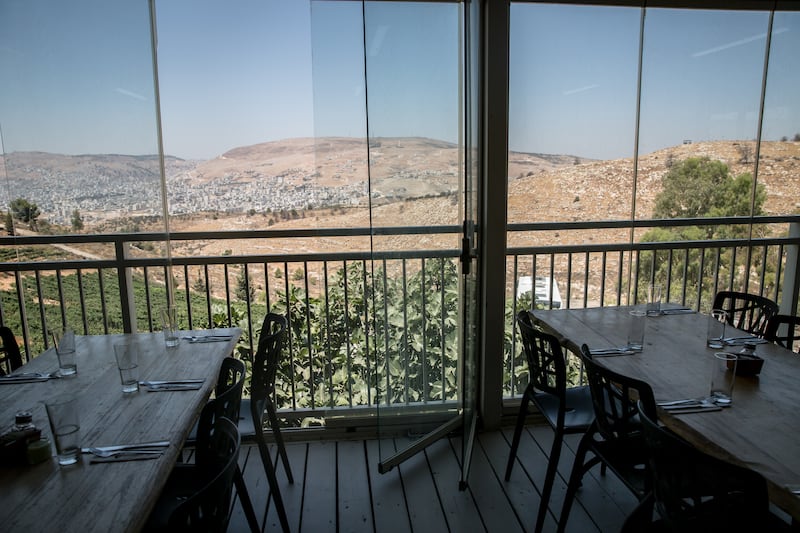 A view from a restaurant in the settlement of Elon Moreh, with the Palestinian city of Nablus in the distance. Photograph: Sally Hayden
A view from a restaurant in the settlement of Elon Moreh, with the Palestinian city of Nablus in the distance. Photograph: Sally Hayden
Galia Ach (41) was born in Russia and came to Israel aged nine. She moved to the settlement of Eli two decades ago, after her wedding.
She says that settlers “know … Arabs are against us and look at us like enemies” but it is not something they “feel every day”.
“The Arabs, they work in our homes … we know them like private people and they don’t let us feel that they hate us.”
She says Palestinians do work which Jewish people are unwilling to do, including building homes or fixing cars. She believes settlements are beneficial for Palestinians and should not be boycotted “because we Jewish people … have a lot of money” whereas Palestinians “need it … Their financial [situation] is not so good. They tell us they are afraid that they won’t have work”.
Ms Ach, a speech and language therapist, says she has heard complaints that Jewish people are stealing land from Palestinians but “I don’t know … my children don’t do it”.
“I’m just living my life and I don’t really ask any questions or I almost don’t see news,” she says.
Her friend, Sheila Klein (44), accuses Palestinians of “burning the farms of Jewish people”, saying the settlers only act in “self-defence”. She says she supports the assault on Gaza, where local authorities say the death toll has topped 64,000.
“We don’t have a choice [but] to fight the Gaza people … On 7 October [2023] they committed terrible abuses against our people, so our people hate them.”
Airbnb
Another short drive away, David Stern (44) points to the metal skeleton beside his home that will become a new house: he will probably turn it into an Airbnb, he says.
Airbnb’s Middle East headquarters, however, is in Ireland. This means that, if services are included in the final version of Ireland’s Occupied Territories Bill and it comes into force, the multinational may no longer be able to host listings in the occupied Palestinian territories.
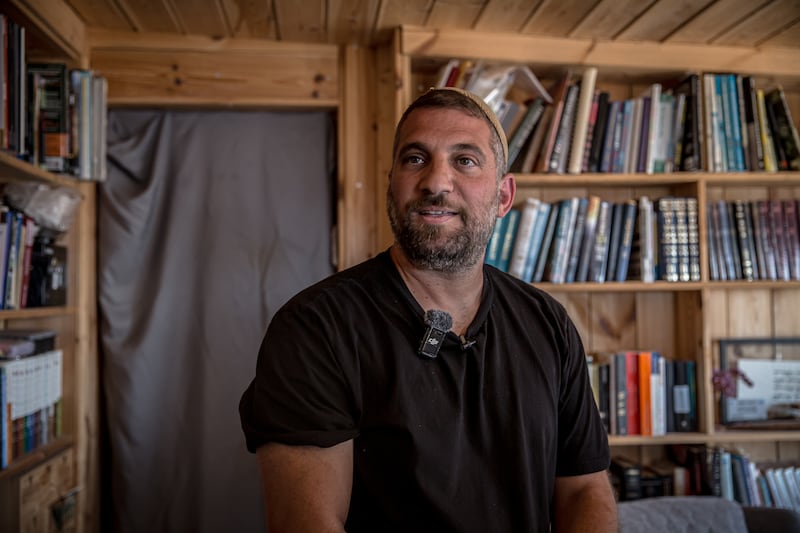 Former US marine David Stern (44) says he feels a ‘deep sense of purpose’ as a settler in the occupied West Bank. Photograph: Sally Hayden
Former US marine David Stern (44) says he feels a ‘deep sense of purpose’ as a settler in the occupied West Bank. Photograph: Sally Hayden 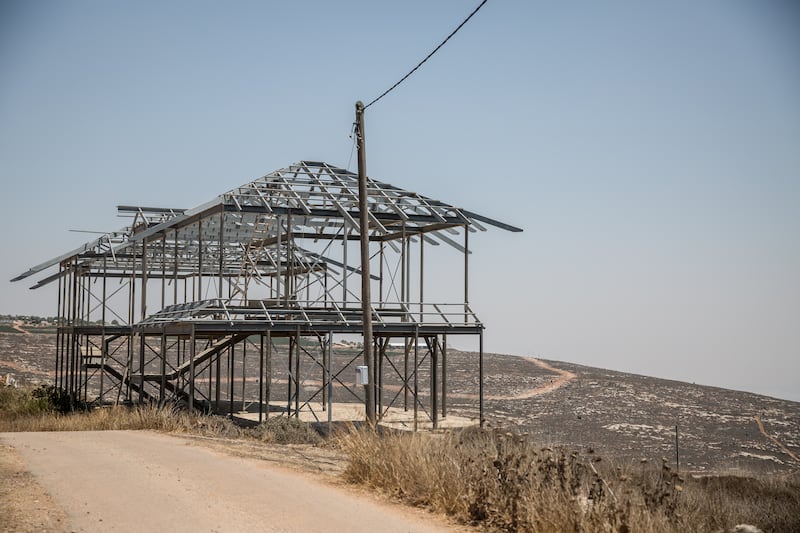 A potential future Airbnb in the Alumot outpost in the occupied West Bank. Photograph: Sally Hayden
A potential future Airbnb in the Alumot outpost in the occupied West Bank. Photograph: Sally Hayden
Mr Stern is a former US marine, originally from New York. He has done several “tours” with the Israeli military in Gaza, where he insists a genocide is not taking place.
When he is not there, he lives with his Canadian-Israeli wife Rachel in the West Bank, where his bookshelf includes titles like Accuracy and Precision for Long-Range Shooting; Deep Survival – Who Lives, Who Dies and Why; and Emergency War Surgery.
Mr Stern moved to Israel in 2002 and has lived the past 16 years in the Alumot outpost, close to a settlement called Itamar. He says the couple love the “tight-knit” settler communities and feel they are “contributing in a meaningful way”, with a “very deep sense of purpose in day to day life” and a “deep connection in a biblical sense” to the land.
Yet living there is dangerous, he says. In early 2023, he says he was driving in the Palestinian town of Huwara when he saw a Palestinian man “hiding one of his hands in a little bit of a suspicious manner”. Mr Stern reached for his own pistol before the man shot at the car, he says – hitting Mr Stern with four bullets – two in his arm, one in his chest and one in his head. He remembers shooting back and wounding the other man. He calls his survival “miraculous”.
While there are cases of Israelis being killed by Palestinians in the West Bank, there is vast disparity in terms of who the most common victims are. Over the past three years, at least 1,260 Palestinians have been killed in the West Bank, including at least 257 children, according to UN figures. This compares to 69 Israelis who have been killed, of whom at least 29 were Israeli forces and 36 were settlers; at least 10 were children.
When Mr Stern says Israeli settlers are necessary for safety, it is clear whose safety he is referring to. “We are a security belt for the centre of the country,” he says.
When asked whether Israel will annex the whole of the West Bank or expand their territory even further, he responds: “I don’t determine national policy.” But he would “absolutely” like to see settlers return to Gaza too, even if he feels a “little old” to move there himself.
